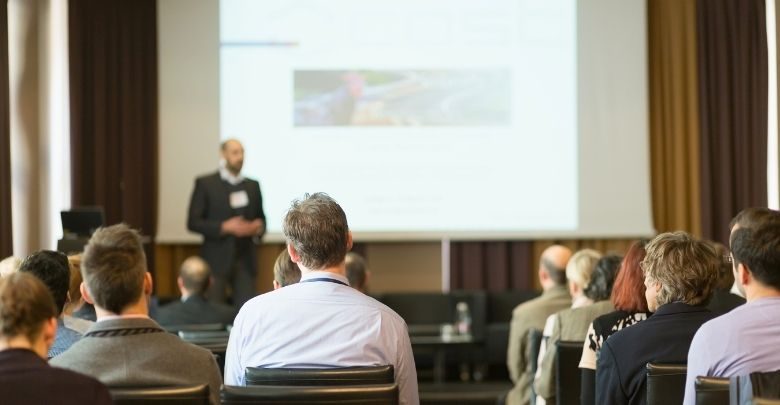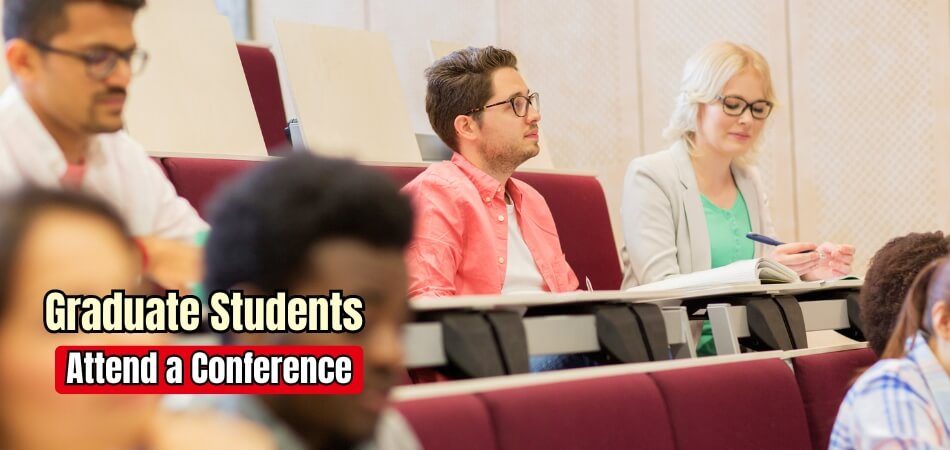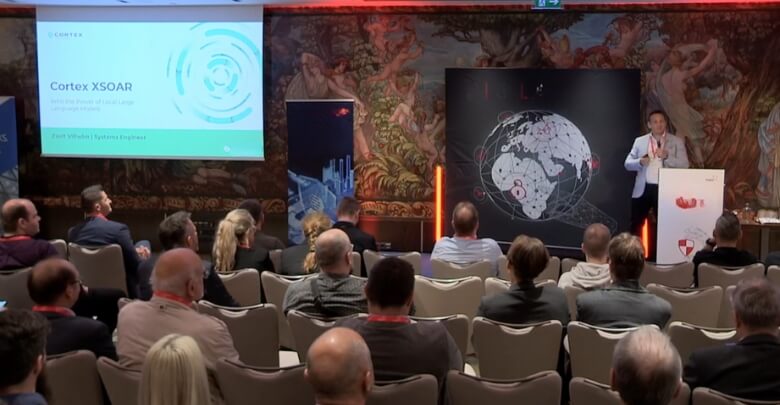Professionals, researchers, and experts gather at conferences to exchange knowledge, creating lively centers of connections and ideas, or present their research. For graduate students, the question may arise: Should graduate students attend a conference if they are not presenting? It’s a common consideration as students look to balance time and opportunities wisely.
Yes, attending a conference without presenting can also be valuable for graduate students, as it offers deep knowledge of current research, fresh ideas, and the chance to build a network of professionals. Participating allows them to learn from experts, explore emerging trends, and develop essential skills by observing effective presentation techniques, even when they are not presenting themselves.
Curious about how attending conferences without presenting can improve your graduation career? Read on to discover every essential insight into making the most of your conference experience, connecting with peers, and gaining inspiration for your academic growth.
What is a Conference Presentation?
A conference presentation is a chance for researchers and professionals to showcase their findings on specific topics. At conferences, people share their work with an audience that often includes experts. Presentations may include data and insights that contribute to discussions. Presenters often use slides and visuals to strengthen their knowledge of their ideas.
Planning for a conference presentation requires effort, as presenters aim to make their content informative and engaging. They focus on the main points to keep their findings accessible to various listeners. Presenting at conferences also provides networking opportunities, where professionals meet like-minded people. This exposure can help boost professional recognition and growth.
Many people choose to attend a conference without presenting, allowing them to learn from others’ work and engage in discussions. Listening to diverse presentations keeps attendees updated on current research. It also introduces them to new perspectives, making conferences a valuable source for professional learning and development.
Who Are Presenters at the Conference Presentation?
The conference presenters bring unique expertise, offering insights into diverse topics relevant. Their sessions promise enriching perspectives, highlighting practical experiences and advancements. Here’s a look at the knowledgeable voices shaping this event’s discussions:
Industry Innovators
Market trends and innovative solutions are shared by industry innovators who combine theory and practice. Their expertise spans technology, finance, and sustainability, making their insights widely relevant. Focused on real-world strategies, they emphasize tools and solutions that foster growth, enabling attendees to grasp how new technologies influence modern industry changes.
Academic Thought Leaders
Across fields such as data science, medicine, and education, academics from renowned institutions share cutting-edge research and knowledge. Their presentations encourage deeper understanding, fostering discussions on both theoretical and practical applications. These sessions equip attendees with knowledge that broadens their views on academic advancements in contemporary society.
Inspirational Entrepreneurs
Visionary entrepreneurs share stories of perseverance, exploring how they overcame challenges to achieve success. They reveal strategies for building impactful brands, addressing real obstacles and achievements. Through practical examples, these entrepreneurs inspire attendees to pursue goals with resilience and adaptability, encouraging a spirit of purpose and innovation for future pursuits.
Policy and Governance Experts
Healthcare, environmental protection, and cybersecurity are among the industries that policy experts study. They reveal how policies evolve with social and technological changes, highlighting the importance of informed governance.
Attendees gain insights into ethical practices, ensuring compliance while understanding how policies influence societal progress.
Social Impact Leaders
The leaders of social impact share effective methods for driving positive change in areas like health, education, and equity. Based on their experience in policy and community engagement, they demonstrate collaborative approaches to impact. These sessions provide audiences with practical insights for meaningful, lasting contributions to society.
With each speaker’s unique perspective, the conference offers a chance to explore diverse ideas that inspire actionable change. Attendees gain insights that will empower their professional and personal journeys, making this event an enriching experience for all.
Should Graduate Students Attend a Conference if They Are Not Presenting?
Graduate students often wonder if attending conferences without presenting is worthwhile, especially when the focus is on networking and knowledge gathering. Conferences offer information about diverse research, professional connections, and academic growth opportunities that can be invaluable for students.
Building Professional Connections
Participating in conferences helps students create professional connections that can advance their careers. Meeting researchers, professors, and industry experts at a conference opens doors to collaborations and mentorship. This type of networking may shape future research opportunities or professional roles.
Learning from Experts
Conferences gather leading experts in various fields, which provides students with valuable learning experiences. They get to listen to discussions on the latest research and discover how different methods are applied. This knowledge broadens students’ understanding of their field and motivates new ideas.
Introduction to New Ideas
Conferences are rich with diverse perspectives and research approaches. Graduate students benefit from learning about innovative ideas that they might not encounter in their academic settings. Exposure to different research topics helps students gain fresh insights that can enrich their future projects.
Recognizing Effective Presentation Skills
Observing speakers can teach graduate students a lot about effective communication. By paying attention to presentation styles, students can learn how to effectively convey complex ideas. They might even notice signs of an ineffective conference presentation, receiving knowledge on what techniques to avoid when they eventually present.
Gaining Knowledge of Emerging Trends
Students who attend conferences stay current on the newest developments in their field’s technology and trends. Listening to experts discuss current issues allows students to understand where the field is heading. This understanding can be essential when planning their own research and career path.
Opportunity to Engage in Discussions
Conferences encourage active participation, and even without presenting, students can engage in insightful discussions. Asking questions or adding to conversations allows them to voice their perspectives and learn from others. Engaging in these discussions is a valuable experience in critical thinking.
Inspiration for Future Research
By introducing them to new research topics, conference sessions can motivate graduate students. Discovering emerging trends, unique topics, or innovative methodologies can spark ideas for their projects. This inspiration helps them explore topics that they may not have considered before.
For graduate students, attending a conference without giving a presentation can be very advantageous. The experience offers learning, networking, and growth opportunities that can shape their academic and professional journeys. It’s a chance to deepen their knowledge and prepare for future research.
How to Attend the Right Conferences to Attend as a Grad Student?
Participating in the right conferences as a graduate student increases learning, connects you with mentors, and boosts career growth. Selecting wisely opens doors to valuable knowledge and networking. Here’s how to ensure your experience is rewarding and impactful:
Step 1. Define Your Conference Goals
Identifying your goals for attending conferences makes it easier to select ones that align with your academic and professional aspirations. Determine whether you’re seeking knowledge, networking, or publication opportunities. Clear goals help you navigate choices and make each experience productive, allowing you to select events that advance your personal and academic growth.
Step 2. Research Conference Relevance
Exploring each conference’s relevance to your field ensures that you only attend events with valuable content. Look at previous presenters, key topics, and workshops offered. Choosing conferences closely tied to your research area maximizes learning and networking. Ensuring relevance helps you get the most from each conference experience.
Step 3. Analyze Networking Opportunities
Conferences vary in size and audience, impacting the networking benefits available. Smaller events often allow more personalized interactions, while larger ones provide wider exposure. Evaluate attendee profiles and networking sessions offered to decide which event best suits your connection-building goals, giving you access to influential academics and professionals in your field.
Step 4. Consider Location and Budget
When selecting conferences, location and budget are important considerations. Some events may require travel or accommodation that significantly impacts your finances, so consider online options when necessary. Many conferences also offer reduced rates or scholarships for students, helping you to manage costs while attending essential, field-specific conferences.
Step 5. Review Post-Conference Benefits
Some conferences provide lasting benefits, such as online resources, recorded sessions, or membership access to journals. Review these options as they offer long-term value beyond the event itself. Post-conference materials allow you to revisit presentations, enhancing the initial learning experience and extending the value of your attendance in practical ways.
Selecting the right events can greatly enrich your graduate journey, especially with essential registration for conference presenters to secure your participation, ensuring each event is a meaningful investment in your academic and professional future.
Tips for Making the Most of Your Conference Experience as Graduate Students
As a graduate student, attending conferences is a great way to learn more, network with professionals, and get ideas for your future career. Here are some practical tips to maximize your experience:
- Prepare Questions in Advance: To encourage intelligent discussions, prepare well-thought-out questions about sessions and presentations. This preparation shows genuine interest and encourages meaningful exchanges with speakers and other attendees.
- Network During Breaks: Use breaks and social events as valuable networking time to build connections outside formal sessions. These casual settings can lead to authentic, memorable interactions that deepen professional relationships.
- Engage on Social Media: Join event hashtags and live discussions to connect with attendees before, during, and after the conference. Engaging online expands your reach and maintains connections beyond the event itself.
- Take Focused Notes: Write down key points and actionable insights that you can refer to later. Organized notes are a great resource and help retain essential ideas and strategies shared during presentations.
- Attend Diverse Sessions: Balance your schedule with sessions within and outside your primary field to gain fresh perspectives. Exploring new topics can open doors to interdisciplinary ideas and innovative approaches.
- Follow Up with Connections: After the conference, send personalized follow-up messages to people you connected with. This follow-up reinforces relationships and helps build a network that supports your career growth.
- Participate in Q&A Sessions: During sessions, ask questions and contribute to discussions whenever possible. Engaging actively in Q&A fosters a collaborative environment, showcasing your involvement and curiosity to both peers and experts.
Making the most of each conference enriches your learning, creating valuable memories and professional connections. By actively participating and engaging, you ensure a rewarding experience that impacts your journey as a graduate student.
Frequently Asked Questions (FAQs)
For graduate students, attending conferences without presenting can open doors to learning and networking that significantly shape their academic journeys. Here are answers to common questions to help you understand the benefits and considerations of attending conferences as a non-presenter.
What Are the Benefits of Attending Conferences Without Presenting?
You can concentrate fully on networking and learning if you attend without giving a presentation. You can absorb more knowledge from sessions, explore new ideas, and engage with professionals in your field. This experience often provides valuable insights and connections without the added pressure of preparing a presentation, allowing you to maximize the experience.
How Can Graduate Students Build Networks at Conferences?
Social gatherings, Q&A sessions, and networking events are ways for graduate students to meet peers and experts. Engaging in discussions and asking questions during sessions helps create memorable interactions. By introducing yourself and showing interest in others’ work, you’ll expand your network and discover future collaboration opportunities.
Is It Worth the Expense to Attend a Conference Without Presenting?
For many students, the networking, learning, and introduction to new ideas justify the expense of attending. Conferences often provide student discounts or funding opportunities. Additionally, the connections you make and insights you gain can be well worth the cost, especially if they improve your future academic and career prospects.
How Can Non-Presenting Students Prepare for a Conference?
Preparing specific questions, researching the speakers, and familiarizing yourself with the conference agenda will enhance your experience. You’ll gain more from each session if you know the key topics and have a plan for attending sessions that align with your research interests. Preparation also boosts your confidence in networking scenarios.
Can Attending Conferences Boost Confidence for Future Presentations?
Yes, observing others present at conferences is excellent preparation for future presentations. By watching different speaking styles and presentation techniques, students can learn what works well. Gaining familiarity with the conference environment also builds confidence, making you feel more prepared for presenting at future events.
End Note
Even without the stress of giving a presentation, attending conferences as a graduate student can have a life-changing effect. These events offer a unique opportunity to immerse yourself in the latest research and trends while connecting with professionals and fellow students. Each interaction and session can provide insights that enrich your academic journey.
In response to the question, Should graduate students attend a conference if they are not presenting? the answer is a resounding yes. The value gained from exposure to expert discussions, networking opportunities, and new ideas far outweighs the need to present. Each conference visit can inspire future research and foster important relationships in your field.
To maximize your conference experience, remember to prepare your questions, engage actively in discussions, and take thorough notes. Don’t forget to follow up with new contacts afterwards to strengthen those connections. Best wishes as you start on this exciting way into the world of conferences!








